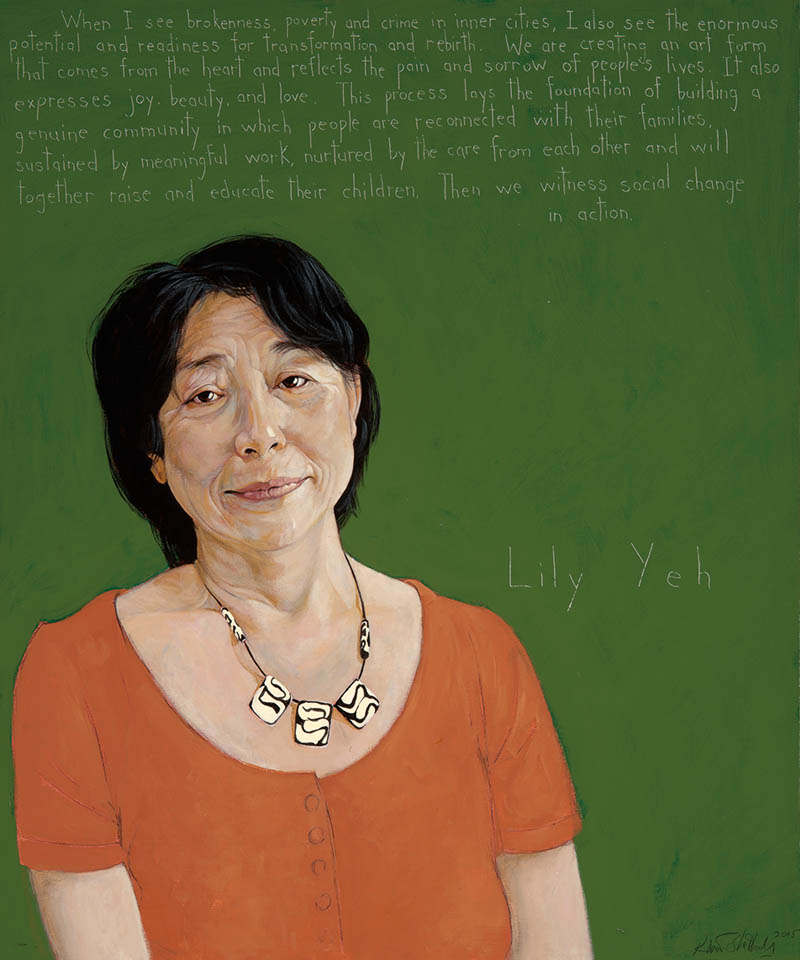
Lily Yeh
Artist, Social Pioneer : b. 1941
“When I see brokenness, poverty and crime in inner cities, I also see the enormous potential and readiness for transformation and rebirth. We are creating an art form that comes from the heart and reflects the pain and sorrow of people’s lives. It also expresses joy, beauty, and love. This process lays the foundation of building a genuine community in which people are reconnected with their families, sustained by meaningful work, nurtured by the care from each other and will together raise and educate their children. Then we witness social change in action.”
Biography
In 1986, Lily Yeh was asked by the dancer and educator Arthur Hall to create a park in an abandoned lot next to his building in North Philadelphia. With a small grant, a few shovels, and little else, Lily invited children and adults in this ravaged inner city neighborhood to join her in clearing the rubble-filled lot. They then transformed the lot into an art park with brilliant mosaics and sculpted trees, creating an oasis of safety and peace.
The park blossomed into The Village of Arts and Humanities, a community-based art organization that Lily co-founded in 1989. Lily, neighborhood residents, and staff have transformed more than 120 abandoned lots into gardens and parks. They also have renovated abandoned homes, and created educational programs, art workshops, after-school programs, a youth theater, and joyful community celebrations. Today, the Village of Arts and Humanities serves thousands of low-income people every year.
Lily’s vision has rippled out far beyond North Philadelphia’s borders. She inspires and collaborates with prison inmates to create beauty and art, and does the same with thousands of adults and children who live in some of the world’s most broken communities. She has collaborated with residents of the Korogocho slum near Nairobi to transform a barren churchyard with murals and sculptures and traveled to Ghana, Ecuador, The Ivory Coast and the Republic of Georgia to work on similar projects. A recent endeavor is the Rwanda Healing Project, in which she worked with hundreds of children and families to transform their bleak village into a place of beauty and joy. The work is based in a village of survivors of the horrendous Rwandan genocide of 1994. Now, Lily also is helping the Twa pigmy people in Rwanda raise their standard of living with a successful pottery business.
Born in China, Lily emigrated to the United States in the early 1960s to attend the University of Pennsylvania’s Graduate School of Fine Arts. A successful painter and professor at Philadelphia’s University of the Arts, Lily traveled to Beijing in 1989 to show her work at the Central Institute of Fine Art. While there, she witnessed the tragic events of Tiananmen Square. Through the 1980s, Lily gradually realized that being an artist “is not just about making art…It is about delivering the vision one is given…and about doing the right thing without sparing oneself.” She continues pursuing her vision through her new organization, Barefoot Artists, Inc., which teaches residents and artists how to replicate the Village model in devastated communities around the world.
Another new project of Lily’s is the Dandelion School for the children of migrant workers in China. In the spring of 2011 New Village Press published Awakening Creativity: Dandelion School Blossoms, Lily’s account of the joyous work she and the students did to transform their school. Full of color pictures of the paintings and mosaics of the students, this book is the most complete account of Lily’s work and process.
LILY YEH´S MOMENT OF TRUTH
I am a very late bloomer. I responded to my calling rather late in life, in my forties. But I have been looking for it for a long time.
I am grateful that my life up to that time has been sweet and good. I have been blessed with a loving family, supportive friends, a fine job and opportunities to create. But I felt that I was missing something, which I could not even name. Without it, somehow my life did not feel authentic.
In 1986 I was given an opportunity to work in inner city North Philadelphia, turning an abandoned lot into an art park with the help of local residents, who were mostly children. The experience was challenging and profound. It brought me to a place where I have never visited before. It felt truthful and genuine. I knew then that I was stepping into my own path and that my activities have meaning. Guided by the light within, I felt a great urgency to move forward.
It seems that in connecting to what is true within myself, I help other people to connect. Making genuine connection lies at the beginning of building a real community.
Programs
Americans Who Tell the Truth (AWTT) offers a variety of ways to engage with its portraits and portrait subjects. Host an exhibit, use our free lesson plans and educational programs, or engage with a member of the AWTT team or portrait subjects.

Education
AWTT has educational materials and lesson plans that ask students to grapple with truth, justice, and freedom.

Exhibits & Community Engagement
AWTT encourages community engagement programs and exhibits accompanied by public events that stimulate dialogue around citizenship, education, and activism.